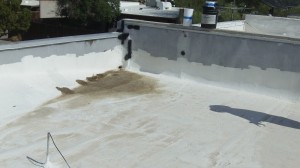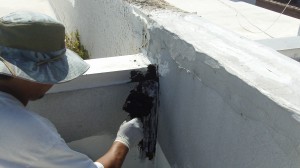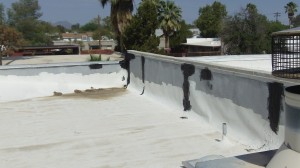One of the jobs associated with operating a fixer upper and rental house business is to keep your rental properties in ship shape!
With the annual approach of summer rains, now is almost the last chance to make rental house roofs water proof before the watery onslaught. As someone who has a sworn aversion for arriving too early to parties, I subscribe to the time-tested philosophy of “better late than never.”
This morning I applied some black roofing cement on some areas on one of my townhouse roofs. I had located some cracks upon my inspection of it about 2 weeks ago.
The first photo shows the area in question, where I had previously applied a small amount of plastic roofing cement, but today I was going to put on some more and cover a broader area.
The second photo shows the application of the plastic roofing cement. We apply one layer of cement, then put a white membrane on top of that, followed by a second layer of cement. The membrane allows for more cement to be applied.
Below is the “after” photo. You can see that in addition to the corner, we hit a few other cracks with our roofing cement on the sides of theroof. Later, we’ll come back with white roofing paint to cover the black cement.
A good rental house
My wife and I purchased this 2 bed 2 bath townhouse in 1993 and lived in it for 10 years before moving on to a bigger house (to accomodate our growing family), and turning this property into a rental house in 2003.
Its been one of our best rental houses because it is in a “transition” zone (aka “opportunity zones”) where there is heavy demand for housing, and it is easy to care for because it is compact (1100 sq ft with small front and back yards). The townhouse perfect for single people or small families.
We originally purchased it for $53,000 and we charge $750/month (more if the tenants have pets).
Related Posts









